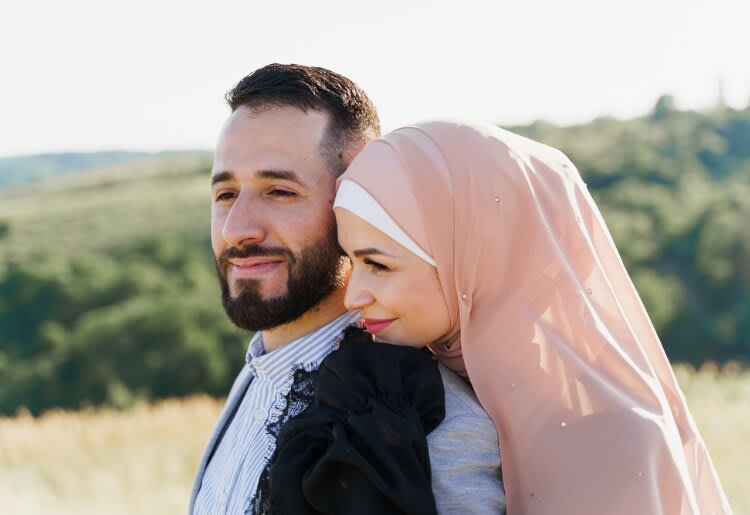If you're wondering if you should end a relationship due to religious differences, it's essential to look at the big picture. As a relationship coach with over a decade of experience, I can help you reflect on these critical considerations.
Religion can be a crucial factor in online dating and relationships. So, let's consider the core factors before deciding if religion is worth breaking up with someone you love.
» Not making progress? Learn more about cognitive biases to avoid when dating.
1. Shared Cultural and Religious Upbringing
Before deciding to end a relationship, reflect on the role of shared traditions in creating a bond between you and your partner. Having similar backgrounds can create a profound connection, making it easier to understand each other's worldview.
When seeking a partner, it's normal to look for someone who shares your values and beliefs. Your cultural and religious upbringing shapes your identity and influences your expectations in a relationship. So, consider how important it is for you or your partner to have this shared connection.
2. Family Expectations and Integration
Religion and family often intertwine, playing a substantial role in relationships. Suppose your family expects your partner to be involved in religious activities, like attending church services, holiday celebrations, or even just saying grace at dinner. In that case, it’s crucial to talk about this openly.
Also, consider if you're willing to participate in your partner’s family’s religious customs, such as attending mosque, temple, or other religious ceremonies.

3. Community Involvement and Religious Events
I've seen that religion often extends into one’s community and social circles. If your faith involves frequent community gatherings, assess how your partner fits into this aspect of your life.
Consider how this might impact your relationship if your social life involves many religious events and your partner does not share your faith. Will you attend events alone, or will your partner be open to participating with you?
4. Religion As a Lifestyle
For religious people, religion goes beyond personal beliefs and shapes their everyday lives. It influences the events and activities you participate in, defining your free time and social connections. Faith is more than just a set of beliefs; it's a way of life that impacts how one interacts with the world.
If you view your religion as a way of life beyond faith, consider how this aligns with your partner’s lifestyle. But if religion is more about personal spirituality than structured practice, there may be more room for compromise.
5. Religion and Raising Children
When you're thinking about the future and possibly having kids, you need to talk about how you'll handle religious teaching for them. You should also consider important religious events in life, like baptisms, bar mitzvahs, weddings, and funerals.
I think having this talk early on is essential. If you can't agree on how to teach your kids about religion, it could mean your relationship won't work out.
6. Secular vs. Religious Worldviews
When partners have differing views on religion—one secular, the other deeply religious—it can lead to disagreements. However, I've seen firsthand that the impact of religious upbringing doesn't always dictate relationship compatibility.
For example, one of my previous clients was Jewish but lived a secular lifestyle and didn't have a problem dating someone who was Catholic, Christian, or not religious at all. This is because religious customs didn't heavily influence their life. Instead, they prioritize other factors in a partner, like shared hobbies and life goals.

7. Can Your Faith Accommodate Other Ones?
Many people deeply value their religious customs as a link to their cultural identity. Depending on how you interpret your faith, some religions may be more or less accepting of other religions.
If you're dating an Orthodox Jew, you may rigorously keep the Sabbath. At the same time, a Muslim may faithfully perform daily prayers and observe fasting during Ramadan. Understanding and respecting Halal dating rules becomes essential if you're interested in dating a Muslim.
» Want to meet Jewish singles? Check out our top picks for the best Jewish dating apps.
8. Fundamental Differences
At times, the divide in religious beliefs between you and your partner might be too vast to bridge. This is particularly true when core elements of your faith directly conflict with your partner’s beliefs, leading to persistent disagreements.
It’s essential to identify these fundamental differences early in the relationship, especially if you think your casual relationship is getting serious. Suppose you find yourselves constantly in conflict over religious matters and unable to find common ground. In that case, this could be a sign that your relationship is over.
9. Communication and Mutual Respect
A healthy relationship is grounded in mutual respect and acceptance of each other as you are present rather than on expectations of future change. I find that respect can significantly affect how people view their relationship quality and their place in it.
It's essential to embrace your partner's religious beliefs as they are without expecting them to convert or adjust their views. It may indicate a fundamental mismatch in the relationship if you struggle to accept these differences. Acceptance doesn’t mean you must agree with everything, but it requires understanding and respecting your partner’s choices.
10. Emotional and Psychological Well-being
When love clashes with religious beliefs, it can be tough on your emotions. It's important to pay attention to how this conflict makes you feel and to take care of your mental health. It's essential to find peace and keep yourself emotionally stable. Sometimes, this might mean having to leave a relationship that's causing you stress because of religious differences.
Being in an interfaith relationship can be challenging. If you both started out focusing on something other than religion, adjusting when it becomes important in the relationship can be challenging. If your beliefs strongly differ from your partner's, finding a way to respect each other's views is crucial. It would be best if you didn't have to give up your own beliefs to make the relationship work.

Chart Your Path With Care
Choosing the route that leads to respect and happiness is vital, and sometimes, that might mean making the brave choice to go separate ways. Remember, a strong friendship within your relationship can bridge the gap of differing beliefs, allowing you to move forward with understanding and love.
Ultimately, both partners should feel fulfilled and respected in their beliefs. If this balance is unattainable, it might be healthier for both of you to part ways, allowing each other to find a more compatible match.
» Learn more about the signs you're dating someone for the right reasons.

